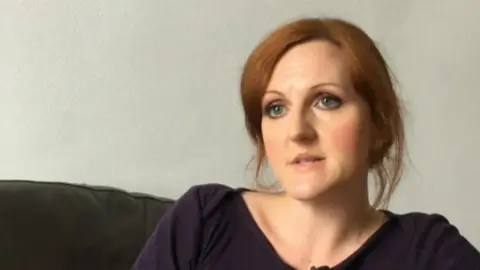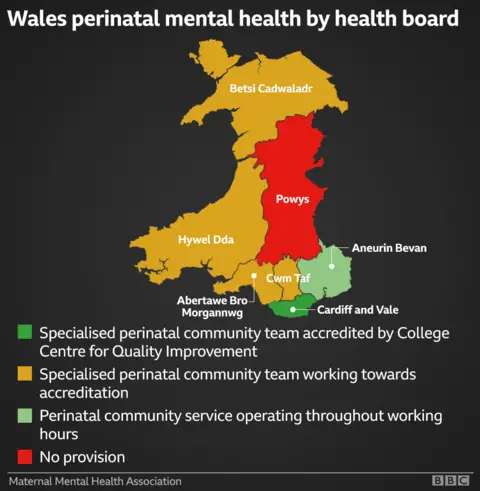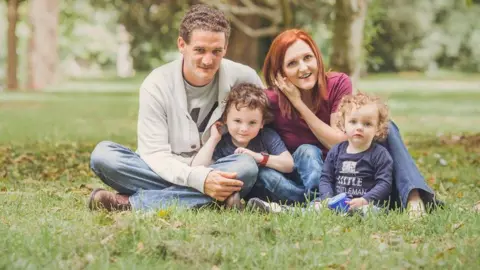Mental health care for new mums 'needs work'
 BBC
BBCSome pregnant women and new mothers in Wales still cannot access specialist mental health services, new research shows.
The Maternal Mental Health Alliance (MMHA) says much more needs to be done to help women suffering from mental illnesses.
These can include anxiety, depression, and postnatal psychotic disorders.
While "essential care" is available for many women, provision in Powys remains a problem, the charity said.
The Welsh Government said it was committed to improving maternal mental health services and the Welsh Assembly has given money to local health boards who have rapidly improved services, the MMHA notes.
But a new map published by the MMHA and created from data collected by the Royal College of Psychiatrists in 2017, marks Powys as red.
While there is some basic provision, women in the area have no access to a specialist perinatal mental health nurse or specialist perinatal psychiatrist, according to the MMHA.
Rhiannon Jones, Director of Community Care and Mental Health with Powys Teaching Health Board said perinatal mental health services are available for Powys residents, "but our small overall population and rurality mean that we do need to take a different approach to other areas of the country".
"In discussion with the Welsh Government, we have agreed to take a more embedded approach to perinatal mental health which has included strengthening our approach within Powys to early intervention, as well as ensuring access to specialist services provided by neighbouring health boards and Trusts where needed."
One in 10
Just two areas in Wales are green, meaning 28% of women in Wales have access to specialist perinatal mental health services.
Women in west and north Wales have access to perinatal community service throughout working hours, shown on the map as amber.
At least one in 10 women having a baby have a significant mental health condition - whether a new onset of an episode of illness, or a existing condition.

This translates into over 3,000 women a year in Wales - but this is likely to be a big underestimate, according to Professor Ian Jones, an expert in postpartum psychosis based at Cardiff University.
There is no psychiatric mother-and-baby unit (MBU) in Wales, which means women have to travel to England to be treated for serious mental health issues.
According to Prof Jones, around 60-80 women in Wales require admission to psychiatric hospital in the perinatal period each year.
Helen Rogers, The Royal College of Midwives (RCMs) director for Wales, said concerns remain over the absence of a mother and baby unit in Wales, which is vital for families and means women are not separated from their babies.
"These units are even more important for single mothers facing mental health problems alone with little or no support for family members," she said.
'I was thinking everyone wanted me to fail'
Charlotte Harding, a 31-year old mother-of-two from Cardiff, suffered a psychotic breakdown 12 weeks after the birth of her first son.
She was diagnosed with bipolar disorder at 20. At 25, she had a traumatic birth experience, losing consciousness soon after giving birth due to heavy blood loss.
"It probably made my post-partum psychosis worse, or even triggered it," she said. When she was eventually handed her baby, she recalled: "I just didn't want to hold him. I was so traumatised."
On the labour ward with her newborn she started suffering from extreme paranoia.
 Charlotte Harding
Charlotte Harding"I started to hear people laughing, feet rushing under the curtain," she added. "I looked and there was no one there."
She hid her true fears from a psychiatrist who came to assess her, afraid her child would be taken away.
At home, she remembered: "I was thinking everyone wanted me to fail. I didn't want anybody to touch my child."
'I thought the radio had started talking to me'
Twelve weeks after giving birth, she had a psychotic breakdown during which she became violent towards her husband and tried to commit suicide.
"I thought the radio had started talking to me, it was extreme paranoia," she said.
She was treated at home, where it took over a year to get better.
"The mother and baby unit was for closure," Ms Harding recalled. "We were told it was understaffed, and the nearest other one was in Bristol."
"Every woman I have spoken to who has suffered postpartum psychosis, they come home (from a psychiatric mother-and-baby unit) and they know what they are doing after 12 weeks."
Ms Harding believes a mother-and-baby unit would have helped her feel better far sooner.
"I had once-a-week visits and took high doses of an antipsychotic," she said.
The Welsh Government says it is exploring options to ensure mothers can receive more intensive and inpatient perinatal support in Wales without being separated unnecessarily from their babies and families.
"Since 2015 we've invested £1.5m a year in community perinatal mental health teams across Wales, which help identify, treat and manage mental ill health before and after childbirth.
"There are now community teams in every health board area in Wales."
